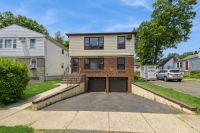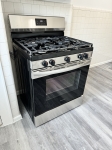What will it take to make fixing NJ Transit a priority?
DaveSchmidt said:
Smedley said: I ride the trains every day. My experience has been that things are moving in the right direction, if very slowly.
Mine, too, especially inbound approaching Secaucus.
Elle_Cee said:
https://www.nytimes.com/2019/07/08/nyregion/nj-transit-train-cancellations.html
Thanks for another perspective, and for that link. I switched jobs a year ago and so wasn't on NJ transit much, then just recently switched again and am back on the trains, so my perspective was from two years ago to now, skipping what the article terms the "annus horribilis". It makes sense then why to me it felt like things are worse, but compared to last year they would feel better
FYI.. this is a good look at why the $75 million state funding increase for FY2020 ($25 mil in Murphy's original budget, plus $50 mil the legislature added) isn't going to do much to improve NJTransit.
Runner_Guy said:
FYI.. this is a good look at why the $75 million state funding increase for FY2020 ($25 mil in Murphy's original budget, plus $50 mil the legislature added) isn't going to do much to improve NJTransit.
https://www.politico.com/states/new-jersey/story/2019/07/12/nj-transit-budget-to-increase-32-percent-after-state-subsidy-boost-1099473
So basically they need more revenue to operate in a reliable way. Which means raising fares and/or additional subsidy from the state of NJ. I think they should do both.
basil said:
Runner_Guy said:So basically they need more revenue to operate in a reliable way. Which means raising fares and/or additional subsidy from the state of NJ. I think they should do both.
FYI.. this is a good look at why the $75 million state funding increase for FY2020 ($25 mil in Murphy's original budget, plus $50 mil the legislature added) isn't going to do much to improve NJTransit.
https://www.politico.com/states/new-jersey/story/2019/07/12/nj-transit-budget-to-increase-32-percent-after-state-subsidy-boost-1099473
And where will the subsidy money come from?
Increase taxes? Murphy tried that, bringing the sales back to 7% and increasing the income tax rate for "millionaires." He failed.
Increased debt? NJ is already drowning in debt.
Car owners? Increase their tolls, registration fees and gasoline tax?
BG9 said:
basil said:And where will the subsidy money come from?
Runner_Guy said:So basically they need more revenue to operate in a reliable way. Which means raising fares and/or additional subsidy from the state of NJ. I think they should do both.
FYI.. this is a good look at why the $75 million state funding increase for FY2020 ($25 mil in Murphy's original budget, plus $50 mil the legislature added) isn't going to do much to improve NJTransit.
https://www.politico.com/states/new-jersey/story/2019/07/12/nj-transit-budget-to-increase-32-percent-after-state-subsidy-boost-1099473
Increase taxes? Murphy tried that, bringing the sales back to 7% and increasing the income tax rate for "millionaires." He failed.
Increased debt? NJ is already drowning in debt.
Car owners? Increase their tolls, registration fees and gasoline tax?
I think NJ should apply the sales tax to gasoline.
Based on how much money was projected to come in when we raised the gas tax as part of the TTF compromise back in 2016, I think this would bring in $800 million -$1 billion to the General Fund, much of which or all of which could be used for NJTransit.
Although there are people who would be hurt by applying the sales tax to gasoline, applying the sales tax to gasoline is not as regressive a tax increase as just raising the sales tax would be, since low-income people themselves often don't drive.
Also, gasoline is a product that out-of-staters in New Jersey tend to buy, so some of the costs of this would be carried by non-New Jerseyans. IIRC, when NJ raised the gas tax in 2016, 10-20% of the money was expected to come from out-of-staters.
Also, raising the price of gasoline has many environmental benefits, since it would encourage conservation. Since a plurality of NJ's CO2 emissions are from transportation (not electricity generation), raising the price of gasoline is a necessary move for us environmentally.
If some or all of the new money were poured into NJTransit, there would be a two-fold environmental benefit since fewer people would be driving.
---
For NJTransit's capital projects, I think that there has to be a combination of more money, plus less expensive construction.
NJTransit has been diverting capital money into operations for years, but I thought this Alon Levy blog was interesting and is a possible explanation for why American construction projects are so expensive.
I don't know how well this applies to NJTransit in particular, but my assumption is that it does.
I spent years plugging the theory that common law correlates with high subway construction costs, and it does in the developed world, but upon looking at more data from developing countries as well as from before the last 25 years, I stopped believing in that theory. It started when I saw a datapoint for Indonesia, a civil-law country, but even then it took me a few more years to look systematically enough, not to mention to wait for more civil-law third-world countries to build subways, like Vietnam. By last year I was giving counterexamples, including Montreal, low rail electrification costs in some common law countries, and the lack of a London cost premium over Paris until the late 20th century.
In lieu of common law, what I use to explain high costs in the US relative to the rest of the world, and to some extent also in most first-world common law countries as well as third-world former colonies, is weak civil service. In the developed world, the theory behind this is called adversarial legalism, as analyzed by Robert Kagan. Adversarial legalism enforces the law through litigation, leading to a web of consent decrees. Some are naked power grabs: for example, in Los Angeles, a union sued a rolling stock vendor for environmental remediation and agreed to drop the lawsuit in exchange for a pledge that its factory be unionized, which may play a role in why the trains cost around 50% more than equivalent European products.
American litigiousness developed specifically in the 1970s – it’s exactly how what the authors of the paper call citizen voice is enforced. In contrast, on this side of the Channel, and to some extent even generally on this side of the Pond, laws are enforced by regulators, tripartite labor-business-government meetings, ombudsmen, or street protests. French riotousness is legendary, but its ability to systematically change infrastructure is limited, since rioting imposes a real cost on the activist, namely the risk of arrest and backlash; in contrast, it is impossible to retaliate against people who launch frivolous lawsuits.
https://pedestrianobservations.com/2019/07/15/costs-are-rising-us-highway-edition/
Hey -- I met Alon Levy a few months ago! He's one of those absolutely brilliant and somewhat quirky characters. He accidentally arrived 45 minutes early to a presentation I was part of, and while he was waiting, he detailed how he traveled there via the NYC transit system. I learned a whole lot more about the NYC transit system and its history in those 45 minutes than I had learned in more than 45 years traveling on it.
To the original topic: Things are going to have to get a lot worse before they get better. I predict that NJ Transit will not get the money it needs to look like a priority for at least 10 years.
sprout said:
Hey -- I met Alon Levy a few months ago! He's one of those absolutely brilliant and somewhat quirky characters. He accidentally arrived 45 minutes early to a presentation I was part of, and while he was waiting, he detailed how he traveled there via the NYC transit system. I learned a whole lot more about the NYC transit system and its history in those 45 minutes than I had learned in more than 45 years traveling on it.
I admit I hadn't heard of Alon Levy until a few months ago, but he certainly seems like a bona fide transit expert, with knowledge of construction and operational practices across the globe.
This is his take on Gateway.
even the cost figure for the bare tunnel—$11.1 billion including minor reconfiguration of the Penn Station throat—is suspect. A three-mile tunnel without station platforms has no reason to cost so much. East Side Access, another New York commuter rail project that is setting world records for its high construction costs, also has a tunnel component: It’s costing only about $350 million per mile for excavation. Second Avenue Subway, another record-setter, cost $240 million per mile for excavation; it’s the station excavation that blew up its budget.
If Gateway cost as much as Second Avenue Subway, the entire project, including systems and overhead, would cost $1.7 billion; if it cost as much as Parisian subway tunnels, it would cost $700 million. Moreover, tunneling underwater seems only somewhat more expensive than underground, enough to raise the budget to $2.5 billion at New York costs or $1 billion at Parisian costs.
Runner_Guy said:
Runner_Guy said:undefined
I spent years plugging the theory that common law correlates with high subway construction costs, and it does in the developed world, but upon looking at more data from developing countries as well as from before the last 25 years, I stopped believing in that theory. It started when I saw a datapoint for Indonesia, a civil-law country, but even then it took me a few more years to look systematically enough, not to mention to wait for more civil-law third-world countries to build subways, like Vietnam. By last year I was giving counterexamples, including Montreal, low rail electrification costs in some common law countries, and the lack of a London cost premium over Paris until the late 20th century.
In lieu of common law, what I use to explain high costs in the US relative to the rest of the world, and to some extent also in most first-world common law countries as well as third-world former colonies, is weak civil service. In the developed world, the theory behind this is called adversarial legalism, as analyzed by Robert Kagan. Adversarial legalism enforces the law through litigation, leading to a web of consent decrees. Some are naked power grabs: for example, in Los Angeles, a union sued a rolling stock vendor for environmental remediation and agreed to drop the lawsuit in exchange for a pledge that its factory be unionized, which may play a role in why the trains cost around 50% more than equivalent European products.
American litigiousness developed specifically in the 1970s – it’s exactly how what the authors of the paper call citizen voice is enforced. In contrast, on this side of the Channel, and to some extent even generally on this side of the Pond, laws are enforced by regulators, tripartite labor-business-government meetings, ombudsmen, or street protests. French riotousness is legendary, but its ability to systematically change infrastructure is limited, since rioting imposes a real cost on the activist, namely the risk of arrest and backlash; in contrast, it is impossible to retaliate against people who launch frivolous lawsuits.
So, what you're saying is that we need more effective government regulation. I agree. That said, I isagree wth the underlying premise that virtually, f not all, f the litigation is frivolous. Everyone loves to put to the McDonalds hot coffee lawsuit as being frivolous. Look at the actual facts. The coffee was served at a temperature well above what was reasonable and appropriate (I think r was abt 40 degrees to hot). This McDonalds had been notified of this. It failed to correct the problem.
Runner_Guy said:
I admit I hadn't heard of Alon Levy until a few months ago, but he certainly seems like a bona fide transit expert, with knowledge of construction and operational practices across the globe.
This is his take on Gateway.
even the cost figure for the bare tunnel—$11.1 billion including minor reconfiguration of the Penn Station throat—is suspect. A three-mile tunnel without station platforms has no reason to cost so much. East Side Access, another New York commuter rail project that is setting world records for its high construction costs, also has a tunnel component: It’s costing only about $350 million per mile for excavation. Second Avenue Subway, another record-setter, cost $240 million per mile for excavation; it’s the station excavation that blew up its budget.https://www.citylab.com/transportation/2018/03/the-gateway-project-doesnt-need-trumps-approval/556106/
If Gateway cost as much as Second Avenue Subway, the entire project, including systems and overhead, would cost $1.7 billion; if it cost as much as Parisian subway tunnels, it would cost $700 million. Moreover, tunneling underwater seems only somewhat more expensive than underground, enough to raise the budget to $2.5 billion at New York costs or $1 billion at Parisian costs.
I'd just add the grain of salt that he is a fairly young academic, with a slight inclination toward provocative theories (which both encourage further thought, and keep academics relevant).
He does point out how our government systems have various regulatory, corrupt, and inept processes that maintain high costs. He also points out that the reason for these processes is they well serve the wealthy, who are happy to maintain these processes as it allows them to buy political power and just make "exceptions" for their preferences (as can be seen in "Teacher Housing and the Rot" https://pedestrianobservations.com/2019/06/22/teacher-housing-and-the-rot/ )
But from what I've noted in your (and sometimes Alon's) focus is an emphasis on change of the former. These conclusions tend to put the burden on the working class by suggesting reducing union power and reducing regulations. While this is likely the easier side of the equation to try to change first, I see the power of the wealthy to opportunity hoard systemically (by influencing policies/politics/litigation/exception cases/concentrations of wealth), as the root cause of corruption and inflated costs. My focus is: How do we change that?
Have to be impressed with the common sense exhibited by some conductors. Young man was just told to take his foot down from the seat across from him.
Now normally that always makes sense.
But if your leg is in a very visible cast because you have a fractured tibia and ligament damage in your ankle that requires surgery on Friday, maybe a little leniency is in order?
Incredible.













If we can do it cheaper while still paying reasonable wages and provide safety to workers, and do not damage the environment, of course we should do that. But I don't want that to be an excuse for not doing anything at all. I would rather overspend on union workers than on Wall Street bankers of Real Estate tycoons.